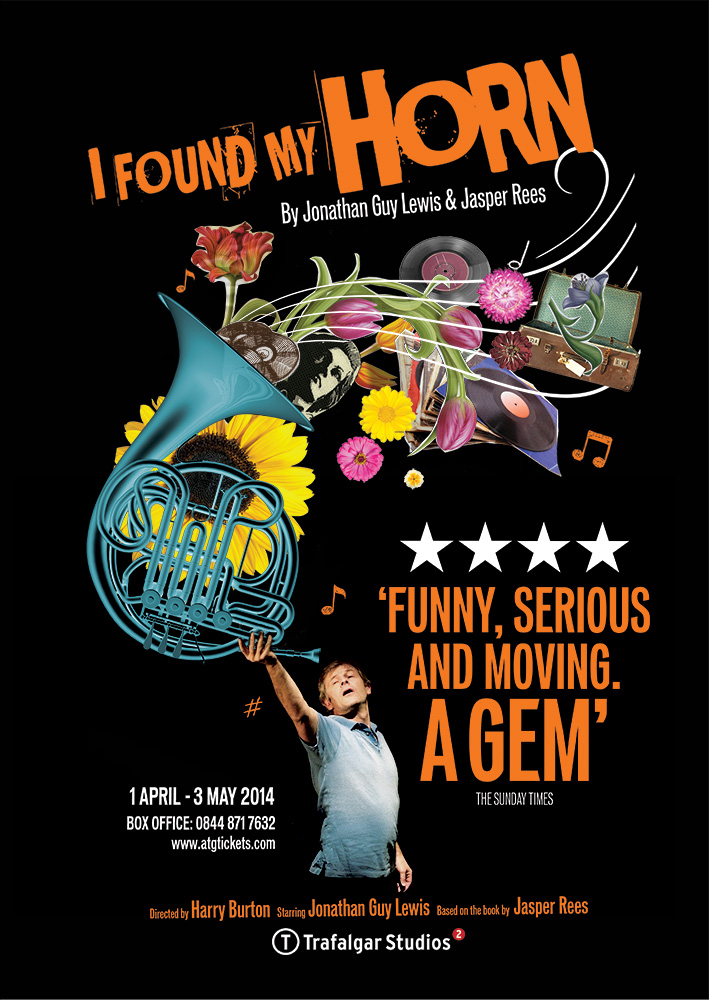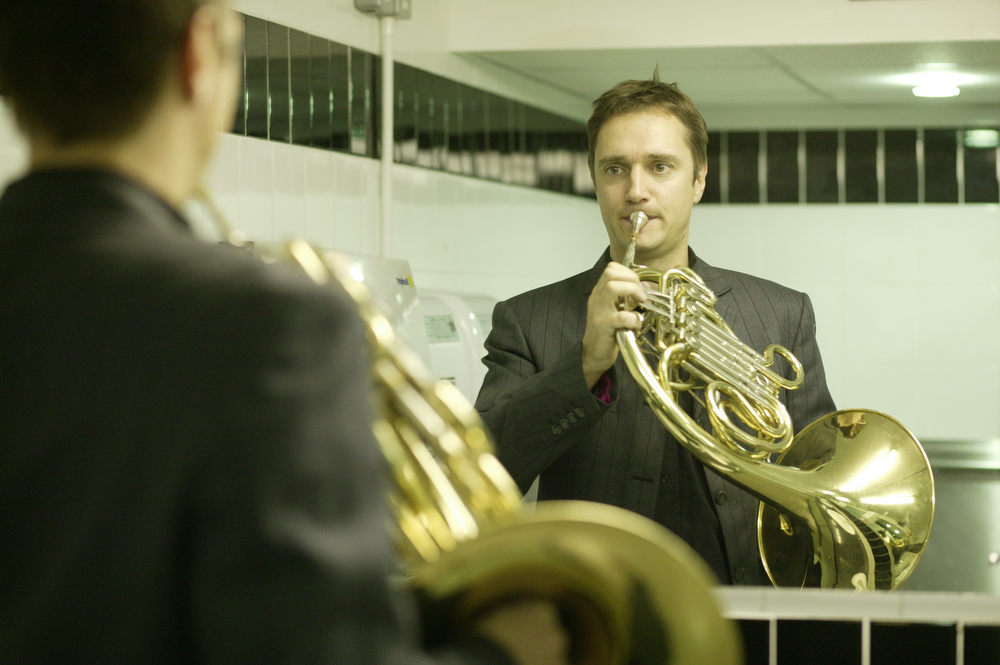When a book is published, there are broadly speaking three alternative fates which lie in wait. It goes global, it sinks without trace, or it sells modestly and steadily to the readership for whom it was intended. There is, however, another potential option, which is that it catches a thermal and veers off in an unforeseen direction.
In 2008 my book I Found My Horn was published. It told of my fractured association with a musical instrument I learned for seven years in my youth, which I then resumed on the brink of my forties. I gave myself a target: at the end of the year I had to stand up in public and play a Mozart concerto to a paying audience. The instrument was the French horn which, as the well-known Flanders and Swann ditty puts it, "is a bit of a devil to play". My subtitle said much the same thing: “One Man’s Struggle with the Orchestra’s Most Difficult Instrument.”
The book was abridged for Book of the Week on Radio 4. A couple of weeks later I heard from an actor/playwright called Jonathan Guy Lewis who wanted to talk about doing a stage version of I Found My Horn. I cordially bit his hand off. Jonathan was also a lapsed horn player. I’d had 22 years off, he’d had 18. My story, he said, sounded pretty much like his too. Within five minutes we had agreed that it must be a one-man play. Also, that vast swathes of the book needed to be stripped out.
 Jonathan and I co-wrote the play in close collaboration with our director, Harry Burton. Five months after we first met, the play opened in a small disused pumphouse in a field by the sea at the Aldeburgh Festival. For the world premiere, I sat next to Dave Lee, the distinguished horn player who’d nursed me towards my performance and was a mainstay of the book. We shared the strange sensation of watching ourselves morphing into stage characters.
Jonathan and I co-wrote the play in close collaboration with our director, Harry Burton. Five months after we first met, the play opened in a small disused pumphouse in a field by the sea at the Aldeburgh Festival. For the world premiere, I sat next to Dave Lee, the distinguished horn player who’d nursed me towards my performance and was a mainstay of the book. We shared the strange sensation of watching ourselves morphing into stage characters.
Six months later, we had a three-week run at the Tristan Bates Theatre in central London. Some critics from the nationals came along, and we sold out. The following year we did weeks at the Orange Tree in Richmond, the Minerva in Chichester and had one-off performances in the Theatre Royal Bath and Frank Matcham’s Opera House in Buxton. Towards the end of 2009, the play had a three-week run at Hampstead Theatre. And that, we thought, was probably going to be it.
Then about a year ago an American producer asked us to fashion another version of the play. He was seeking more detail about the personal traumas which triggered the horn odyssey. As I am far too squeamish to invade my own privacy, we started imagining the disaster zone that is my now semi-fictionalised avatar's personal circumstances. A grumpy teenage boy - a mere cameo in the first version of the play - has loomed up before us and started grumbling in pointed monosyllables. Weirdly, the horn itself has gone all anthropomorphic on us and started making vocal noises.
A London producer soon got hold of the play and invited us to put the new version of the play on in Trafalgar Studios 2. Anyone who saw it last time round may be wondering whether they need to see it again. Aside from a new father-son narrative and a talking horn, there is rather more horn music, and a much more ambitious design. In early stagings there was a just a chair, a music stand and a clothes rail. Later we took to hanging a constellation of a dozen horns above the stage. For this new version of the play our designer Clarisse O'Dell has created a set of animated projections which will give the audience something else to look at apart from Jonathan playing "Jasper" and everyone he encounters on his journey.
But the essential story is still the same, in which all roads lead to the unavoidable stunt at the climax of the play. And it's not just for classical nerds. Neither book nor play is meant to be about just one man and his horn. The hope is that the story has a wider application, that it will inspire recognition in anyone who has ever been in the grip of regret and yearned to seek some form of redemption. Ideally we want you to laugh and cry and fish your old instrument out of the attic. We open on April Fool's Day.
Overleaf: Jasper Rees interviews Jonathan Guy Lewis about playing Jasper Rees (and the French horn)

JASPER REES (pictured above by Dillon Bryden): How good a horn player were you? Better than me, clearly, but that’s not saying much.
JONATHAN GUY LEWIS: I got up to grade eight but never took it. I was a very promising newcomer aged 11. My mother would play the piano for me and we would go round these local music festivals and trounce the opposition. I was younger and you could see their hearts sinking.
I know exactly how they feel. Being beaten by a junior trumpeter was my last date with my Josef Lidl horn before dropping it like a stone for 22 years. Why did you give up?
Is he still me in your head or someone slightly different?
I was losing interest as the years went by. By the time I’d hit 16 it was curtains. I was a junior exhibitioner at the Guildhall on Saturday mornings. But as you say in the book and Jasper says in the play, it was the transposing what done for me. You describe playing Mozart’s third horn concerto at the school concert and that voice in your head telling you it’s terrible. I had the same experience playing the same concerto on exactly the same make of horn - which is also very weird as in the play I’m using your horn. And yet I listened to a little voice in my head saying, “Just faint.”
It’s a thrilling ego boost, naturally, to see an audience enjoy my horn story onstage, but I may as well confess I’m conflicted when this other bloke gets the applause.
Do you want to come on the stage as well?
Yes I sodding well do. But I know the etiquette. I haven’t been sweating bullets out there. Also this latest version of the play has new fictionalised elements. The part of the made-up teenage son has been much expanded and the Lidl (in which, happily, the two middle letters are “id”) has started talking. These were your ideas. How did they happen?
Having done it more than 100 times I felt there was more to be mined with the story. It wasn’t that it was insufficient. But the horn having a voice came to me in a flash. It started talking in this Czech accent. Of course it’s Jasper’s inner voice, his demons, but also his confessor, his confidant. It just felt like a wonderfully theatrical invention, and it honours the horn. And I felt the story of him finding himself through this reconnection with the horn needed to be affirmed in another way: the son created a new point of drama and an opportunity for storytelling.
I have never been more nervous than when I performed K447. When the moment comes, do you have to act the jitters?
I go from trying to play badly, which is not difficult, to the point of performing the full K447 Rondo. It is a challenge, I have to say.
My horn odyssey and my horn mentors remain the backbone of the play. So to me it still looks like my story. This is a hard question to ask of someone playing “Jasper Rees”, but is he still me in your head or someone slightly different? I promise I won’t take the answer personally.
I think it has become someone else now in my head.
Who?!
- I Found My Horn is at Trafalgar Studios from 1 April to 3 May
- I Found My Horn on Facebook
- I Found My Horn on Twitter















Add comment